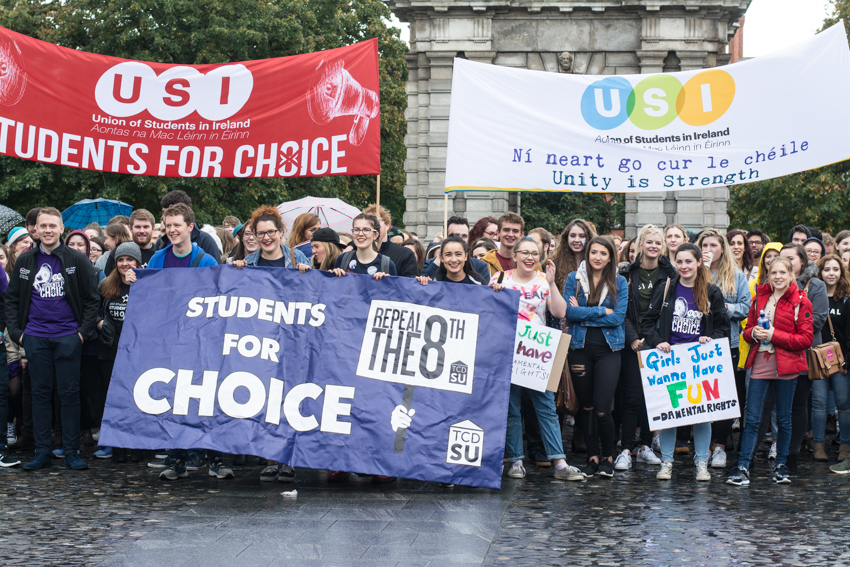
In Trinity, students are consistently seen as promoting their cause in the Arts Block or donning various badges around campus. It seems to be in the nature of students to wholeheartedly engage in social or political activism campaigns. Trinity has seen numerous student campaigns fill its halls over the years, notable examples of which include Feminists of Trinity and Fossil Free TCD. These campaigns are not only about raising awareness but inciting change. At the moment, the national Strike 4 Repeal campaign is sweeping across campus, with its own group in Trinity. Áine Palmer, Chairperson of Dublin University Gender Equality Society (DUGES), and an organiser with Trinity’s Strike 4 Repeal group, supports the notion that students should engage with activism during any spare time they may have. Speaking to The University Times, she states her belief that “campaigns give us a chance to channel energy into actually potentially changing something, be that through policy, action, or information”. Fergal Ó Baoill-Gallchobhair is also taking an active role in the Trinity Strike 4 Repeal campaign in his spare time and summarises the movement as a day of “direct action that will take place on the 8th of March, International Women’s Day, demanding the government to call a referendum to repeal the eighth amendment”.
What sets Trinity’s campaign apart is its tangible focus, Palmer notes: “What I’ve really felt working on TCD Strike 4 Repeal is that it gives all of us a goal that is within our reach – to motivate people to strike on the 8th of March.” On this day, an important demonstration will take place at 12.30pm on O’Connell Bridge, offering activists the opportunity to stand in solidarity with peers, colleagues, family members and all women who are forced to travel abroad daily to get abortions. In this way, campaigning allows students to promote a cause that they are passionate about and hopefully allows them to see real change take shape before their eyes. Ó Baoill-Gallchobhair notes that donating an hour here and there to campaigns such as these is not only our privilege but our duty as students: “We’ve seen from our influential role in the marriage equality referendum how important student participation is in a strike. As a generally liberal student body we have an obligation to make our voices heard beyond our university bubble.”
Many students can feel intimidated by taking part in activism movements for fear they won’t be able to donate enough time, but Palmer is quick to assert that she “would consider everyone who has pledged their support at our [Strike 4 Repeal] stand as being part of this campaign”.
“On March 8th, any action is great, even if that’s just wearing a black armband, or acknowledging that the strike is taking place in some little way. Liking and sharing things on Facebook, talking about it with friends and family, everything is helpful”, Palmer continues. It is clear that taking part in a student-run social or political campaign asks for as much or as little time and involvement as you can spare. Even the smallest sign of support is an important cog in the activism machine, as a collective voice is after all more powerful than an individual one.
Looking back at the work of Trinity College Dublin Students’ Union (TCDSU) over the years makes clear the influence of students. One example is the work of sabbatical officers like Ivana Bacik, who was taken to court by the Society for the Protection of the Unborn Child and threatened with prison for distributing information on abortion to students when serving as TCDSU President in 1989/90. Palmer sees “no reason why we should be any less daring today in striving to achieve reproductive rights for the women of Ireland”.
While these extra-curricular campaigns do require time and energy, Palmer points out the lighter side as well. She emphasises that “it can be really fun, and although the last few weeks have felt a bit mad, it’s also lots of fun and I think when you’re passionate about something you put in the hours you can happily”. In short, if you find a cause you truly care about, there is no reason why you should not take part in an activism campaign. This year, TCDSU has proven itself to be incredibly encouraging of student campaigns and has put a lot of support structures in place in order to make the appropriate channels more accessible. It can therefore be said that activism in Trinity has been made more accessible than ever, and never more important, so use your spare hour around campus wisely and don’t be afraid to stand up for what you care about.






